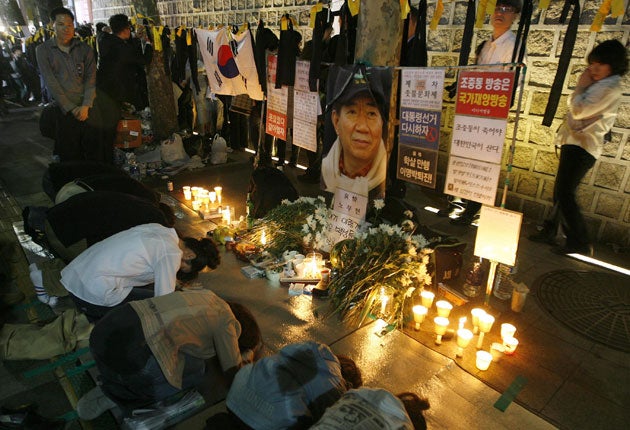South Korea mourns ex-president's suicide
Supporters blame government for hounding Roh Moo-hyun to his death

Your support helps us to tell the story
From reproductive rights to climate change to Big Tech, The Independent is on the ground when the story is developing. Whether it's investigating the financials of Elon Musk's pro-Trump PAC or producing our latest documentary, 'The A Word', which shines a light on the American women fighting for reproductive rights, we know how important it is to parse out the facts from the messaging.
At such a critical moment in US history, we need reporters on the ground. Your donation allows us to keep sending journalists to speak to both sides of the story.
The Independent is trusted by Americans across the entire political spectrum. And unlike many other quality news outlets, we choose not to lock Americans out of our reporting and analysis with paywalls. We believe quality journalism should be available to everyone, paid for by those who can afford it.
Your support makes all the difference.Bowing deeply and laying white chrysanthemums before his portrait, tens of thousands of South Korean mourners journeyed yesterday to the southern village where former president Roh Moo-hyun killed himself by jumping off a rocky cliff overlooking his home.
Braving a downpour, nearly 80,000 people trekked to Bongha, the village 280 miles south of Seoul where Mr Roh had lived since leaving office, to pay their respects at mourning tents erected at the community centre. Hundreds of Buddhist monks in gray robes and wide-brimmed hats held a solemn prayer service.
But several top officials, including the Prime Minister, were turned away from the mourning rites for the liberal ex-leader, who had a fractious relationship with conservative opponents his supporters accuse of driving Mr Roh to his death. They pelted a bus carrying conservative politicians with eggs and doused lawmakers with water.
Mr Roh, 62, who relied on pluck and hard work to rise from his impoverished youth in rural Gimhae to become president in 2003, died Saturday after jumping from a promontory known as Owl's Rock that overlooks his home. He left behind a note that described his suffering over recent corruption allegations and asking to be cremated.
The government and Mr Roh's family agreed to hold a public "people's funeral" after a seven-day mourning period, most likely on Friday, former Roh aide Han Hyung-min said.
Mr Roh's suicide, just 15 months after he left office, came as he and his family faced intense questioning about 7.5bn won (£3.8m) given to the Rohs during his presidency by a Seoul businessman who has been implicated in a number of bribery scandals.
The allegations weighed heavily on a man who prided himself on his "clean" record in a country struggling to shake a tradition of corruption. Prosecutors had been grilling Mr Roh, his wife and their two children about the allegations since last month.
"What's left for me for the rest of my life is just to be a burden to others," Mr Roh wrote in a note on his computer minutes before leaving for the final hike to Owl's Rock with a security guard. "Don't be too sad. Aren't life and death both part of nature? Don't feel sorry. Don't blame anybody. It's destiny."
Mr Roh's suicide stunned the nation of 49 million, which was divided during his presidency between those critical of his outspoken, antiestablishment ways and others who rallied around his efforts to promote democracy, fight corruption and facilitate rapprochement with North Korea.
The mood in Seoul yesterday was sombre. A line at Chogye Temple snaked around the lawn and into the street as Seoulites, many dressed in black and bearing flowers, waited to pay their respects. Many sobbed as they knelt before his smiling portrait.
At a mourning site outside Seoul's 16th-century Deoksu Palace, more than 16,000 people waited in long lines to place white flowers, cigarettes – Mr Roh had recently started smoking – and melons before portraits of the ex-leader.
"I'm really sad. I can feel how much pressure he had been suffering," said Moon Hye-kyung, 47, a businesswoman, wiping away tears with a handkerchief. "I think he could have endured the pressure if it was levelled against only him, not his family members and aides." She, like many others, blamed conservatives for Mr Roh's suicide. But Hong Young-sik, 71, said the government wasn't to blame.
"Why are you guys gathering here? Did he do anything to be praised?" Hong, a former government official, shouted at the crowd. "He only killed himself because he was shamed out of the fact that his and his family's wrongdoing was revealed."
Along Seoul streets, mourners fixed yellow ribbons wishing Mr Roh peace. "We love you. We've been happy with you," some of the messages said. "Please go to heaven and live freely."
Join our commenting forum
Join thought-provoking conversations, follow other Independent readers and see their replies
Comments